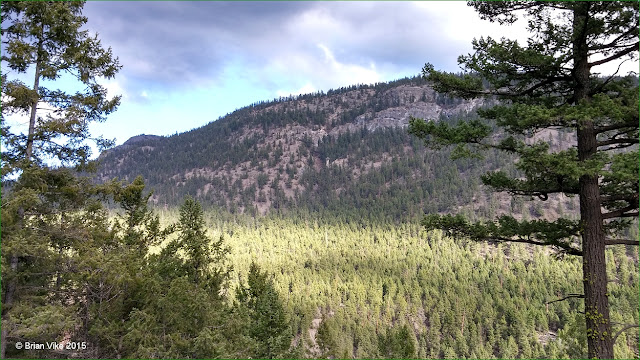Above Photo: Little Man Formation Kamloops, British Columbia.
Above Photo: Blow Up - Little Man Formation Kamloops, British Columbia.
On our visit to my families home in Kamloops, British Columbia, I was
driven around to see some of the sights Kamloops has to offer travelers.
One day my son-in-law and my grandson thought it would be fun if we drove
some of the back roads on the outskirts of Kamloops. As we drove along following
the Tranquille River which was way, way down in a canyon my son-in-law pointed
out a really awesome formation.
The formation was located across the canyon and half way up the mountain side,
and there were no roads that we were able to take for a up close look at this
amazing formation.
Above Photo: Bridge over the Tranquille River Kamloops, British Columbia.
After a good look at the crazy formation through binoculars, we jumped back
into the truck and headed off to another spot they wanted me to see. We started
to drop in elevation to where we came to the Tranquille River. We crossed over a
small bridge and my son-in-law made a turn off the road and into a small B.C.
Forestry recreational site.
Above Photo: Bridge over the Tranquille River Kamloops, British Columbia.
This spot was really beautiful as the Tranquille River went through a mini
canyon and then into a pool. The water was so clear and cold as it was in early
November 2015 when we were there. Also there was ice at the sides of the mini
canyon.
Above Photo: Tranquille River flowing through a mini canyon at Kamloops, British Columbia.
Video Clip: The Tranquille river Kamloops, British Columbia.
There was something else I found really interesting, and that was how so
many trees were twisted and covered in a coating of bright green moss.
Below Text Information is from Wikipedia, the free encyclopedia.
The climate of Kamloops is semi-arid (Köppen climate classification BSk)
due to its rain shadow location. Because of milder winters and aridity, the area
west of Kamloops in the lower Thompson River valley falls within Köppen climate
classification BWk climate. Kamloops gets short cold snaps where temperatures
can drop to around −20 °C (−4 °F) when Arctic air manages to cross the Rockies
and Columbia Mountains into the Interior.
The January mean temperature is −2.8 °C (27 °F).[18] That average sharply
increases with an average maximum temperature of 4.3 °C (40 °F) in February. The
average number of cold days below −10 °C (14 °F) per year is 19.9 as recorded by
Environment Canada.
Although Kamloops is located above 50° north latitude, summers are warm to
hot with prevailing dry, and sunny weather. Daytime humidity is generally low
(sometimes less than 20% after a dry spell) which allows for substantial
nighttime cooling. Occasional summer thunderstorms can create dry-lightning
conditions, sometimes igniting forest fires which the area is prone to.
Spring and fall are usually pleasant and dry but can be short in
duration.
Kamloops lies in the rain shadow leeward of the Coast Mountains and is
biogeographically connected to similar semi-desert areas in the Okanagan region,
and a much larger area covering the central/eastern portions of Washington,
Oregon and intermontane areas of Nevada, Utah and Idaho in the US.
Above Photo: Twisted trees and green moss.
These areas of relatively similar climate have many distinctive native
plants and animals in common, such as ponderosa pine (Pinus ponderosa), big
sagebrush (Artemisia tridentata), prickly pear cactus (Opuntia fragilis in this
case), rattlesnakes (Crotalus viridis), black widow spiders and Lewis's
woodpecker.
Above Photo: Twisted trees and green moss.
The hottest temperature ever recorded at the airport, 40.7 °C (105 °F),
occurred on 13 July 2014; the hottest reliably accurate temperature ever
recorded within the city, 41.7 °C (107 °F), occurred first on 27 July 1939 and
again two years later on 16 July 1941.
Travel British Columbia with Brian Vike blog, please contact me at
b_vike@telus.net
Travel British Columbia with Brian Vike.
Travel Houston, British Columbia with Brian Vike.










No comments:
Post a Comment